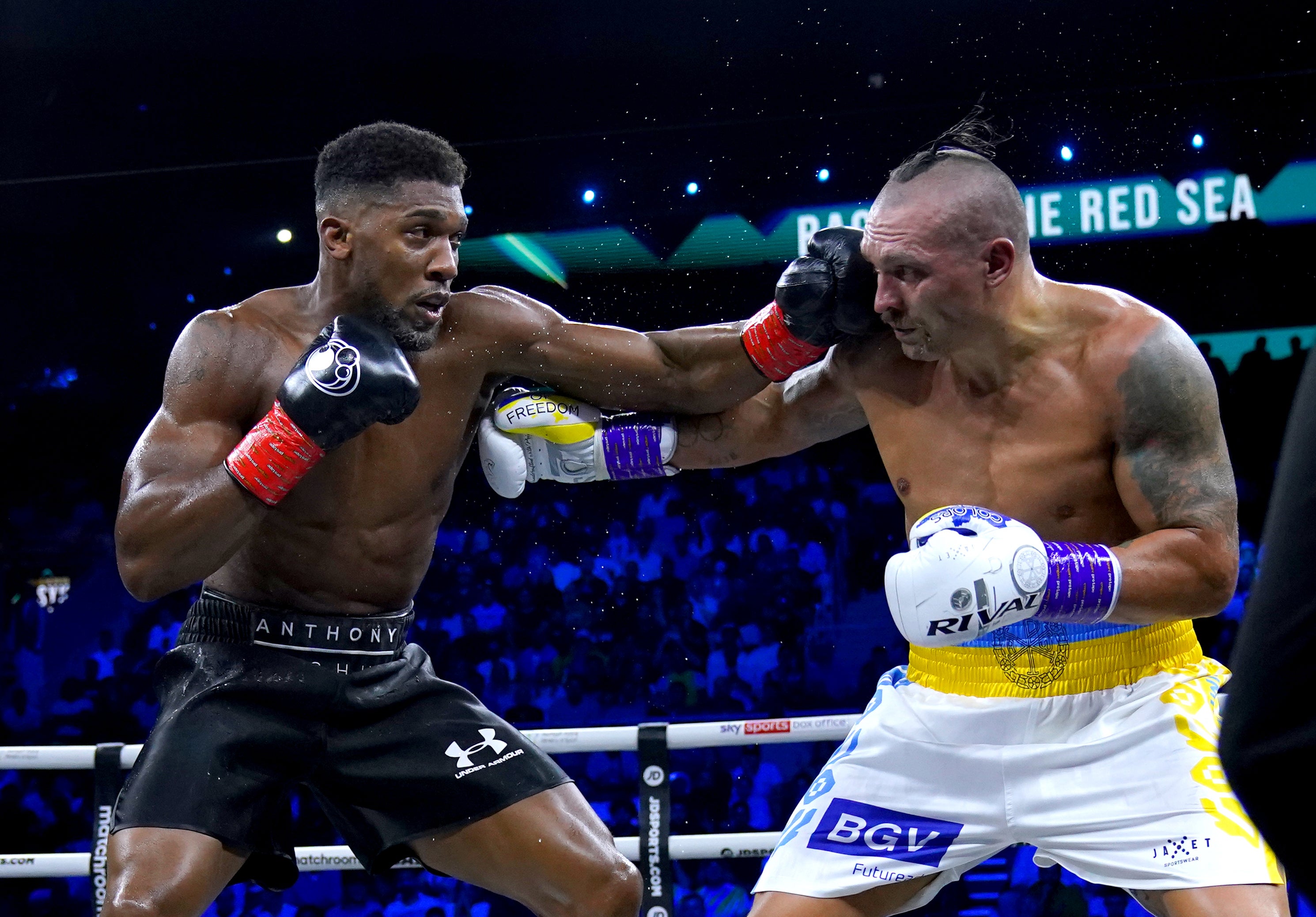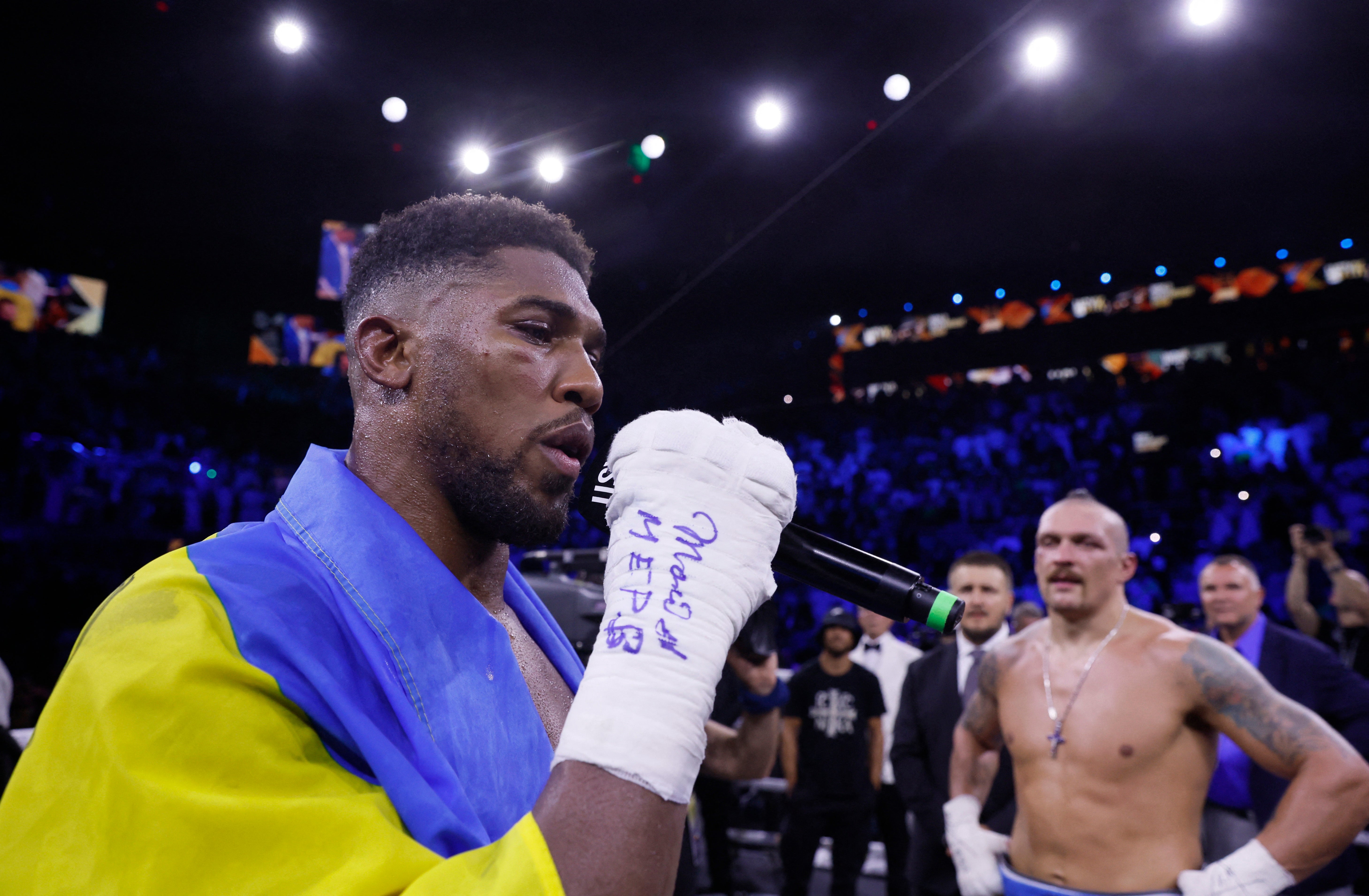
As Anthony Joshua spoke into the microphone, forced to confront the reality that he had just lost the biggest fight of his career, he was calm, introspective and self-critical.
If that behaviour sounds incongruous with the viral scene that played out in the ring on Saturday night in Jeddah, that’s because it is from a different scene entirely. Having petulantly departed the ring after his second straight decision defeat by Oleksandr Usyk, Joshua stormed back up the ramp to confront his conqueror, only to toss two of the Ukrainian’s title belts from the ring and deliver backhanded compliments while venting frustrations over perceptions of his own pedigree.
But on his second attempt, Joshua got it right – unlike in his rematch with Usyk. Hunched over a table, half-hidden by a cap, a diffident “AJ” paid more sincere respect to Usyk and lamented his own inability to avenge last September’s loss. The Briton lamented his shortcomings. “Am I proud of myself? It’s really, really hard for me to say I’m proud of myself. I don’t feel anything, just… I’m upset deep down in my heart. Ah, man... ah, trust me. F***ing hell, man,” he said before bowing his head to conceal the tears.
Joshua had been unable to redeem himself in the ring earlier in the evening but was intent on at least partially redeeming himself on the microphone, at the post-fight press conference. The 32-year-old did not want his legacy to be that of a beaten behemoth, driven mad by the licking, flickering flames inside him; consumed by the fire that he could not satiate through his in-ring efforts.
Joshua has always been aware of his legacy – perhaps frightened by it. That much has never been clearer than in his reaction to this second defeat by Usyk. The Briton’s second speech in the early hours of this Saudi Sunday morning marked an attempt to maintain his historically respectful demeanour; his first one suggested that the pressure of living up to certain expectations and defying others has taken a gruelling toll on the Adonis over the last decade.

In the build-up to Joshua’s rematch with Usyk, “AJ” was reticent about the impending clash. He might have been better off addressing some of what he unleashed after the fight, before the fight. Maybe if he had been more candid about the claustrophobic pressure he was feeling, one surely unrivalled in the sport, he would have exorcised some of those demons without having to – and failing to – do so inside the ropes, against arguably the best boxer on the planet.
But for as much as talking might have helped Joshua, and for as much as he could control the perception of his career by atoning for his confused monologue, the reality is this: The heavyweight’s legacy was always destined to be defined by his boxing. Somehow, he must find a way to be at peace with that.
Joshua will not go down as the heavyweight of his generation; for all of Eddie Hearn’s meticulous machinations, his fighter’s hulking frame was organically eclipsed by that of Tyson Fury at a certain point. The “Gypsy King” is flawed, probably more so than Joshua, but is unapologetically unfiltered. Again, though, that alone would not be enough. Fury’s performances in the ring have proven enough – notably an awkward, unassuming dissection of Wladimir Klitschko, an enthralling trilogy of clashes with Deontay Wilder, and a homecoming dismantling of Dillian Whyte.
Joshua, too, destroyed Whyte and took out Klitschko in a war at Wembley Stadium, also recording wins against Joseph Parker, Carlos Takam, Alexander Povetkin and Kubrat Pulev – stopping the latter two in stunning fashion. But while Fury has stayed unbeaten, despite genuine jeopardy against Wilder in their first and third meetings, Joshua has now been defeated three times on grand stages.

There is, of course, nothing wrong with that; many of the greatest boxers of all time have suffered famous losses. Yet Joshua’s defeats by Usyk have been enlightening.
The 2012 Olympic gold medallist was a darling of the nation a decade ago and thrilled fans with numerous knockout nights on his way to the top. He generally maintained his predatory finishing ability against a stagnant level of opposition, and his shock stoppage by Andy Ruiz Jr in 2019 was a blip – a wrong he quickly corrected six months later with the most disciplined display of his career.
Against Usyk last September, however, Joshua’s lack of adaptability and lack of instincts were clear to see. In their rematch, the same faults felled Joshua. Again, there is no shame in that; Usyk was undisputed cruiserweight champion before moving up to heavyweight, where he became unified champion and has proven himself as a pound-for-pound contender.
Joshua’s losses to Usyk have sealed the Briton’s fate, though, as regards his ability to one day retire as his nation’s premier heavyweight. That may be a shame to him and a shame to his promoter, but it need not eat at Joshua so ravenously.
Joshua was most beloved when he was pummelling competitors, regardless of their stature, and there is still time for him to do that again. He enthralled the British public and reinvigorated the casual fan with his aggressive style and eye-catching knockouts, and Hearn gave him the perfect environment to exhibit those attributes: stadium shows with genuine senses of occasion, parties for the British boxing fandom.
A new run of scintillating stoppages against lesser opponents might not lead to a third reign as world champion. That is arguably inconsequential, but it might help Joshua to rediscover his love of boxing. It might help fans to rediscover their love of him.







